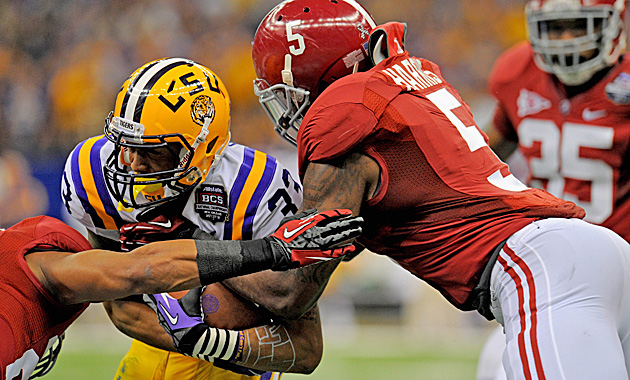 |
| The SEC, going off past BCS Top 25 standings, should demand the biggest slice of the media-rights pie. (Getty Images) |
CHICAGO -- One proposal being considered by the commissioners on dividing the estimated $400 million in media rights revenue is by using past performance, specifically the past BCS Top 25 final standings.
Even though these standings are released after the conference championship games and do not include results of the bowl games, they are one way at looking at a conference's overall strength -- or lack of strength.
Where the commissioners' proposal gets tricky is they are using the projected conference memberships in 2014, so if a school was in the final rankings in 2009, but will be in a difference conference in 2014, that school's new home gets credit for its success.
In my column Monday, I broke down the conferences based on the final Top 25 BCS rankings since 1998, compiling the results of the past 14 years. However, let's narrow our focus to the past five years and the results are a lot different.
Here are the cumulative points per conference (based on 2014 membership) compiled by CBSSports.com for the Top 25 final BCS rankings for the past five years since 2007. First place finish worth 25 points down to one point for 25th place finish.
1. SEC 407 points
2. Big 12 361 points
3. Big Ten 259 points
4. Pac-12 224 points
5. ACC 184 points
6. Big East 130 points
7. BYU 31 points
8. MWC 30 points
9. C-USA 5 points
10. MAC 4 points
11 (tie). Notre Dame, WAC and Sun Belt 0 points
Breaking it down by school reveals some surprises among the nation's elite.
Here are the top 25 teams (based on 2014 membership) compiled by CBSSports.com for the Top 25 final BCS rankings for the past five years since 2007. First place finish worth 25 points down to one point for 25th place finish.
1. Alabama 81 (SEC)
2. Ohio State 79 (Big Ten)
3. LSU 78 (SEC)
(tie). Oklahoma 78 (Big 12)
5. Boise State 74 (Big East)
6. Oregon 73 (Pac-12)
(tie). Tech" data-canon="Virginia Cavaliers" data-type="SPORTS_OBJECT_TEAM" id="shortcode0"> 73 (ACC)
8. TCU 68 (Big 12)
9. Florida 59 (SEC)
10. Texas 56 (Big 12)
11. Oklahoma State 55 (Big 12)
12. Stanford 49 (Pac-12)
13. Wisconsin 46 (Big Ten)
14. Georgia 42 (SEC)
(tie). USC 42 (Pac-12)
16. Cincinnati 41 (Big East)
17. Georgia Tech 39 (ACC)
(tie). Missouri 39 (SEC)
19. Arkansas 38 (SEC)
20. Penn State 35 (Big Ten)
(tie). West Virginia 35 (Big 12)
22. State" data-canon="Michigan Wolverines" data-type="SPORTS_OBJECT_TEAM" id="shortcode0"> 34 (Big Ten)
23. BYU 31 (Independent)
24. Utah 31 (Pac-12)
25. Auburn 29 (SEC)
Here is the conference breakdown for the Top 25 BCS rankings since 2007 (listed by 2014 conference membership). First place finish worth 25 points down to one point for 25th place finish.
SEC (407 points)
1. Alabama 81; 3. LSU 78; 9. Florida 59; 14. Georgia 42; 17. Missouri 39; 19. Arkansas 38; 25. Auburn 29; 26. South Carolina 24; 41. Tennessee 10; 45. State" data-canon="Ole Miss Rebels" data-type="SPORTS_OBJECT_TEAM" id="shortcode0"> 6; 54. Ole Miss 1.
No surprise the SEC is No. 1 the past five years with 11 of 14 teams with Top 25 finishes. The only three SEC teams without a Top 25 BCS finish since 2007: Kentucky, Vanderbilt and -- yes -- newcomer Texas A&M.
Big 12 (361 points)
3. Oklahoma 78; 8. TCU 68; 10. Texas 56; 11. Oklahoma State 55; 20. West Virginia 35; 28. Texas Tech 19; 31. Kansas 18; 31. Kansas 18; 36. Baylor 14.
Iowa State is the only league member without a Top 25 BCS finish since 2007. TCU and West Virginia made big impacts in easier conferences, but can they duplicate that success in the Big 12? We'll find out starting this fall.
Big Ten (259 points)
2. Ohio State 79; 13. Wisconsin 46; 20. Penn State 35; 22. Michigan State 34; 28. Nebraska 19; 33. Iowa 17; 38. Illinois 13; 38. Michigan 13; 52. Northwestern 3.
Minnesota, Indiana and Purdue are the only Big Ten teams that have not had a Top 25 BCS finish. If not for Ohio State's poor showing in 2012, the Buckeyes would have easily been the nation's highest overall ranked team in the past five seasons.
Pac-12 (224 points)
6. Oregon 73; 12. Stanford 49; 14. USC 42; 24. Utah 31; 34. Arizona State 15; 44. Oregon State 8; 45. Arizona 6.
Utah is ranked fourth among the Pac-12 teams, earning all its points in the Mountain West. Probation has kept USC from being a top 10 overall ranked team, while the Pac-12 has had seven of its 12 members ranked in the final BCS rankings since 2007.
ACC (184 points)
6. Virginia Tech 73; 17. Georgia Tech 39; 27. Clemson 22; 33. Pittsburgh 15; 36. Boston College 14; 40. Miami 11; 45. Virginia 6; 50. Florida State 4.
Virginia Tech is one of only two teams to finish in the final Top 25 BCS rankings in each of the past five years. Yes, the ACC has struggled in the BCS bowls, but don't blame Florida State: the Seminoles can't win enough games to make a BCS bowl. FSU has one 22nd place finish in the final BCS rankings in the past five years.
Big East (130 points)
5. Boise State 74; 16. Cincinnati 41; 44. Houston 7; 48. South Florida 5; 53. UCF 2; 54. UConn 1.
Boise State is the only other team to finish in the final Top 25 BCS rankings in each of the past five years. How desperately does the Big East need Boise? The Broncos have more points in the past five years than the entire remaining Big East membership combined.
Independents (31 points)
23. BYU 31.
Even though BYU hasn't been ranked in the final Top 25 BCS rankings the past two seasons, BYU still cracked the overall Top 25. All of the other independents -- mighty Notre Dame, Navy and Army -- have not finished in the final Top 25 BCS rankings in the past five years. The Irish was last ranked in the 2006 final poll at No. 11
Mountain West (30 points)
28. Hawaii 19; 40. Nevada 11.
Conference realignment has completed gutted the Mountain West, which was the former home of Top 25 teams TCU, Utah, BYU and Boise State. The Broncos stay around for one more year before leaving for the Big East in 2013.
Conference USA (5 points)
48. Southern Miss 5.
Southern Miss is one of only three C-USA teams with a final Top 25 BCS ranking. However, the other two -- Houston and UCF -- join the Big East in 2013.
MAC (4 points)
50. Ball State 4.
Ball State earned the MAC's only final Top 25 BCS ranking in 2008, finishing 22nd. That's good enough to rank 50th nationally during the past five years and tie the Cardinals with Florida State.



















